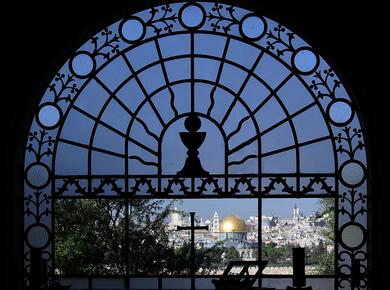Posted: October 23, 2023
October 2023
At a time of increasing bloodshed between Israelis and Palestinians, with mounting tension between nations of the Middle East and beyond, leaders of Mennonite World Conference make three urgent appeals:
- That member churches of Mennonite World Conference pray and act for an end to the spiral of violence and injustice1 in the Middle East, recognizing that favouring one nation or ethnicity to the detriment of another harms the gospel2 and humanity;
- That Palestinian militants cease their assault on Israelis, release hostages, and seek nonviolent ways to address their just concerns;
- That Israeli government cease their current assault on Gaza and the West Bank and begin to redress the decades of occupation and dispossession perpetuated upon Palestinian people.
Caring for both Israelis and Palestinians
We as Christians are the “wild olive shoot” grafted into a Jewish root (Romans 11:17). Thus, we honour Judaism and respect the modern nation of Israel when it governs justly and treats all peoples equally. Likewise, we stand in solidarity with the Palestinian people in their need to live in safety and dignity in their own land. We grieve and protest the massacre of Israelis recently committed by Hamas. We also grieve and protest the constant loss and humiliation that Palestinians have suffered over the last seventy-five years of Israeli occupation.
We call on Christians, by the power of the Holy Spirit, to embody the wide embrace of the gospel (Matthew 28:19, 20) in which there is “neither Jew nor Gentile” (Galatians 3:28). Promises of land possession that God made to the biblical patriarchs have long been fulfilled (Joshua 21:43–45). The gospel is no longer good news if it means that Palestinians must sacrifice their lives and hopes for the well-being of Jewish people displacing them.
Modern Israel and ancient promises
Although we condemn antisemitism and support the need for Jewish people to live in safety today, we underscore that it is inappropriate to view the modern state of Israel simply as a continuation of ancient Israel. God’s love revealed in Jesus Christ equally embraces Jews and Palestinians. Christians place our hope for the future in the global New Jerusalem (Revelation 21, 22), not in any sequence of eschatological events focused specifically on the Middle East.
We remind Christians who do view the modern state as a continuation of biblical Israel that divine promises about the land have a condition: God’s people must obey covenant (Leviticus. 18:26–29; Deuteronomy 28:15). Remembering their own suffering in Egypt, Israelites were to treat vulnerable people fairly (Deuteronomy 24:16–22). Jesus’ last words before the Ascension were a warning against his followers doing end-times speculation about the future of Israel (Acts 1:7, 8; see also Mark 13:32). Instead, Jesus said, proclaim the gospel to all peoples of the earth.
Although they are a small minority today, there is an indigenous Christian presence in Palestine with roots reaching back to the apostolic church. These Christians suffer when fellow believers elsewhere in the world give uncritical support to Israel.3
Jesus embodies a global justice vision
When Jesus approached Jerusalem on the week of his Passion, he wept over the city saying, “If you only had known on this day the things that make for peace” (Luke 19:42). Jesus also acted: he entered the courts of religious and political power to confront those who abused their power. God intended the temple to be a “house of prayer for all nations” (Mark 11:17). Jesus embodied the prophecy of Isaiah that all nations would stream to Jerusalem, that peoples of the world will beat swords into plowshares and not learn war any more (Isaiah 2:2–4). Today we remain committed to that reconciling vision for Israelis and Palestinians, and for peoples in conflict anywhere in the world.
We will speak to governments and religious leaders throughout the world, urging them to seek justice for both Palestinians and Israelis and not simply support one side or the other. We ask nations of the world to stop supplying arms to the warring parties, and to work with the community of nations to seek a just peace.
In the end it will be God who brings healing to the nations. We live into that hope by praying, “thy kingdom come, thy will be done on earth as it is in heaven” – and by following the nonviolent way of Jesus, the Prince of Peace.
Until then we cry out “God, have mercy!”
Henk Stenvers, MWC President
César García, MWC General Secretary
1 Some scholars speak about three forms of violence that perpetuate the “spiral of violence”: Systemic Violence (Violence #1), Revolt (Violence #2), and Repression (Violence #3).
2 “Gospel” refers to a holistic, all-encompassing, liberating message of God’s peaceable (and, therefore, justice-filled) kingdom made known and visible in the world. This message overturns the logic of death and its different manifestations, including violence, oppression, injustice, and death itself, into that of life in abundance.


Join the Conversation on Social Media
FacebookTwitterInstagramFlickrYouTube